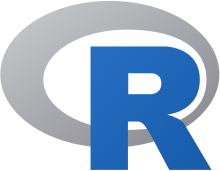
R packages are extensions to the R statistical programming language. R packages contain code, data, and documentation in a standardised collection format that can be installed by users of R, typically via a centralised software repository such as CRAN (the Comprehensive R Archive Network).[1][2] The large number of packages available for R, and the ease of installing and using them, has been cited as a major factor driving the widespread adoption of the language in data science.[3][4][5][6]
Compared to libraries in other programming languages, R packages must conform to a relatively strict specification.[3] The Writing R Extensions manual[7] specifies a standard directory structure for R source code, data, documentation, and package metadata, which enables them to be installed and loaded using R's in-built package management tools.[3] Packages distributed on CRAN must meet additional standards.[3][8] According to John Chambers, whilst these requirements "impose considerable demands" on package developers, they improve the usability and long-term stability of packages for end users.[3]
- ^ Hornik, Kurt (2020-02-20). "Frequently Asked Questions on R". The Comprehensive R Archive Network. 7.29: What is the difference between package and library?. Archived from the original on 2011-07-09. Retrieved 2 November 2020.
{{cite web}}: CS1 maint: location (link) - ^ Wickham, Hadley; Bryan, Jennifer. "Introduction". R Packages (2nd ed.). Archived from the original on 2022-06-29. Retrieved 2020-11-02.
- ^ a b c d e Chambers, John M. (2020). "S, R, and Data Science". The R Journal. 12 (1): 462–476. doi:10.32614/RJ-2020-028. ISSN 2073-4859. Archived from the original on 2020-11-01. Retrieved 2020-11-02.
- ^ Vance, Ashlee (2009-01-06). "Data Analysts Captivated by R's Power". New York Times. Archived from the original on 2021-05-02. Retrieved 2020-11-02.
- ^ Tippmann, Sylvia (2014-12-29). "Programming tools: Adventures with R". Nature News. 517 (7532): 109–110. doi:10.1038/517109a. PMID 25557714.
- ^ Thieme, Nick (2018). "R generation". Significance. 15 (4): 14–19. doi:10.1111/j.1740-9713.2018.01169.x. ISSN 1740-9713.
- ^ "Writing R Extensions". The Comprehensive R Archive Network. Archived from the original on 2020-11-12. Retrieved 2020-11-02.
- ^ "CRAN Repository Policy". The Comprehensive R Archive Network. Archived from the original on 2020-11-05. Retrieved 2020-11-02.